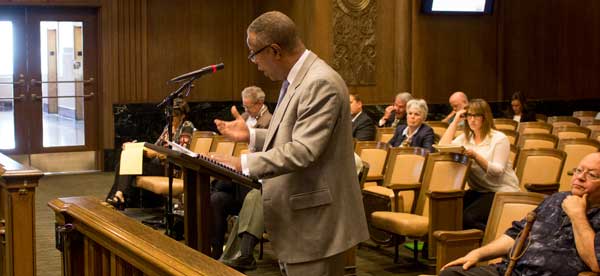
Attorney Mark Bryant told the City Plan Commission Highwoods Properties, owner of the Plaza, opposes the Midtown/Plaza area plan. The commission gave unanimous approval to the draft plan and sent it on to the city council for consideration.
More than two years and hundreds of hours of meetings have gone into the development of the proposed Midtown/Plaza Area plan. On Tuesday, the City Plan Commission gave its unanimous approval, the first step in a round of city hearings that are expected to lead to adoption by the city council.
Planners, neighborhood leaders and others repeatedly praised the high level of interest and the many hours that neighborhoods, businesses and institutions spent in developing the plan.
And while they also praised the process, two groups – Plaza owner Highwoods Properties and Kansas City Life Insurance – opposed parts of the plan that they said would restrict business and development in some parts of the Midtown area.
The city has been systematically reviewing the numerous planning documents that have accumulated over the years. It has been creating, instead, broader area plans which “recommend strategies to help realize a community’s long-term vision for the future and to provide a comprehensive framework to guide public decisions on land use, housing, public improvements, community development and city services.”
The Midtown/Plaza area, which the city defines as 31st to 55th Streets, State Line to the Paseo, contains 27 neighborhoods, many historic buildings, and some major institutions. While the city usually develops its plans in nine months to a year-and-a-half, this process took longer, in part, planners said, because of the greater-than-average interest Midtown residents demonstrated in sharing their views.
“It was a pretty long process because we wanted to make sure we got it right,” Director of Long Range Planning Kyle Elliott said.
The issue that drew the most intense interest was planning for the Plaza, an area that has seen what Rockhill neighborhood resident Marshall Miller called “epic battles” around redevelopment.
“Early in the plan it became clear that the Plaza plan concepts were important. We heard loud and clear that the Plaza subarea was important,” said John DeBauche, one of the city planners who guided the process.
That led to 21 meetings with businesses, institutions and neighborhoods, and revisions to the Plaza Urban Design and Development Plan of 1989. Many residents argued it was important to preserve key parts of that document including the “bowl concept” meant to restrict taller buildings to the outer edges of the area.
President of Historic Kansas City Greg Allen said he was initially skeptical of “messing with the Plaza plan,” but in the end he thinks the new plan both “perpetuates the best of the 1989 plan and adds some important new elements.”
Former city planning director Vicki Noteis, who participated in the Plaza plan discussions, said not all of the issues got worked out, but the plan will protect the historical character of the Plaza and allow appropriate development to continue.
But attorney Mark Bryant, speaking on behalf of Highwoods Properties, said the restrictions in the proposal would make it harder to attract tenants because of the addition of regulatory approvals on top of what is already in place.
“This is a shopping district first and foremost. Not a museum. Not an art gallery,” Bryant said.
Another objection came from Kurt Schoeb representing Kansas City Life, who said that company owns 95 percent of the property in the Valentine neighborhood north of Thirty-fifth Street and has been an anchor for the area for decades.
“The plan limits possible future development in the Midtown area,” he said.
A suggestion came from South Plaza Neighborhood President Keith Spare, who urged the commission to strengthen language mandating neighborhood involvement in the development and redevelopment process.
“We often hear about things when it is almost a done deal,” he said.
After hearing the concerns and suggestions, the commission unanimously passed the proposal as it came to them without changes, saying the community had shaped the document in the two-year process. They also discussed the importance of actually putting the plan into effect, which will be guided by an as-yet-unappointed implementation committee.
“Implementation may be more important on this plan than it has been on the others,” Noteis said.



Kc life as “anchor” i wonder whjch definition he is thinking of